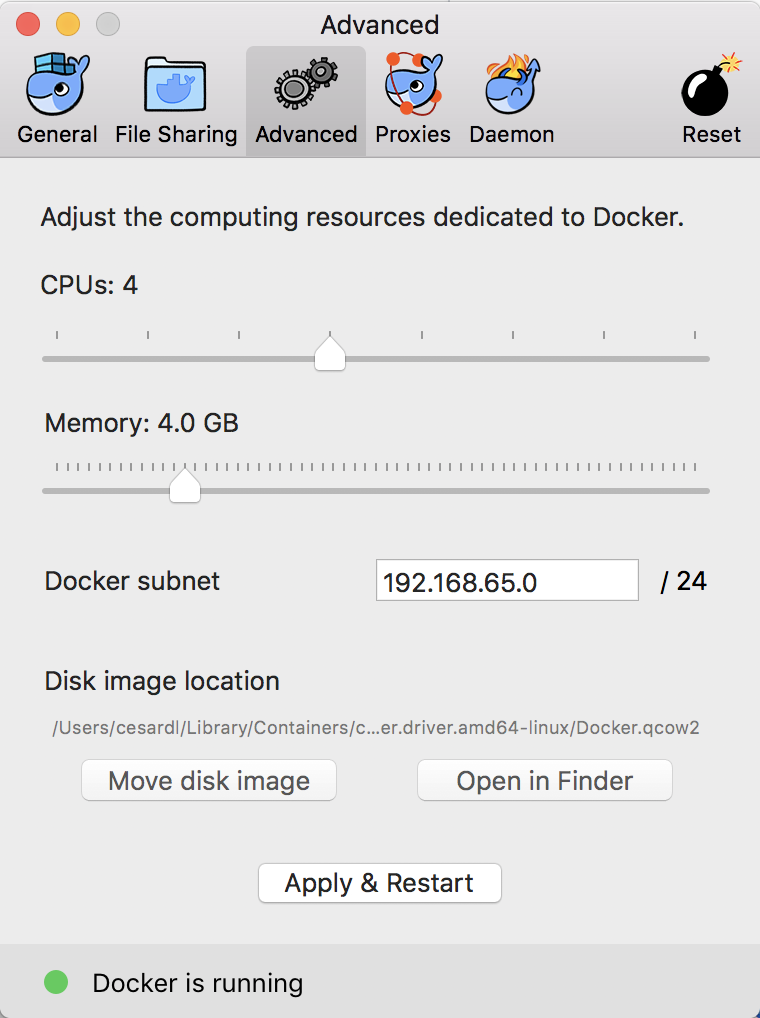Docker Container Download For Mac
In this Docker tutorial, you’ll learn Docker vocabulary and the commands for creating, inspecting and removing containers, networks and data volumes. You’ll learn how to run Docker containers in the background or foreground, and switch between the two; how to publish ports; how to connect a database app and a web app running in separate containers; and how to share directories between. This question main use case would be to access the applications running in the container from host(Mac) machine or other machines in the host(Mac) network. Once the container application has been started and exposed as below. Docker run -d -p 8080 Then find the mapping between the host(Mac) port with container port as below.
Docker is available for Linux, MacOS, and Windows.
MacOS
Docker for Mac is best installed with Homebrew and Homebrew Cask. For other ways to install on MacOS, see Install Docker for Mac in Docker's docs.
Arch Linux
Docker is available in Arch Linux's repositories. Also see Docker in ArchWiki.
Ubuntu
docker.io is available from the Ubuntu repositories (as of Xenial).
docker.io package isn't available for you, see Get Docker CE for Ubuntu for an alternative.
Windows
Install Windows Subsystem for Linux and choose Ubuntu as your guest OS. Install Docker as you normally would on Ubuntu (see above). After that, see these instructions for info on how to get it running.
Docker Container Download For Mac Windows 10
Other OS's
For other operating systems, see: https://www.docker.com/community-edition#download
Verifying if it works
If everything works, you should have the following commands available:
Starting Docker
If you get an error like the one below, you might need to start the Docker daemon.
To start the Docker daemon, it probably needs one of these commands
Enabling on startup
For Arch Linux, Ubuntu and CentOS, this will enable auto-starting of the Docker service:
1 docker environment installation
1.1 install Yum utils
1.2 add docker warehouse location for Yum source
1.3 installation of docker
1.4 start docker
2 common commands of docker image
2.1 search image
2.2 find the supported version of the image
Enter the official website of docker hub at: https://hub.docker.com , and then search for the image you want
2.3 download image
2.4 list images
Docker Container Download For Mac Os
2.5 delete image
Specify a name to delete the image:
Delete mirror with specified name (mandatory)
Delete all unreferenced images
Force all mirrors to be removed
3 common commands of docker container
3.1 create and start container

Parameter interpretation
-P specifies the port mapping in the format: hostPort:containerPort
—Name option: specify the name of the container after running as mysql, and then the container can be operated by name
-D means running in the background
3.2 list containers in operation
3.3 list all containers
3.4 stop the container
For example: docker stop MySQL or docker stop b417ac5a44b0
3.5 forcibly stop all containers
For example: docker kill MySQL or docker kill b417ac5a44b0
3.6 start stop container
For example: docker start MySQL docker start b417ac5a44b0
3.7 access to containers
First find out the PID of the container
Enter the container according to the PID of the container
3.8 delete container
Delete specified container
Delete container by name
Force delete all containers
3.9 view the container log
View the current container log
View the current container log dynamically
4.0 view the IP address of the container
4.1 modify the startup method of the container
4.2 specify time zone when starting container
4.3 check the usage of docker container CPU, memory, network and IO on the host computer
View the specified container
- View all containers
View docker disk usage
4.4 bash in docker container
Use the root account to enter the bash in the docker container
4.5 create external network
4.6 modify the location of docker image
Docker Container Download For Mac Download
- View the location of docker image
- Shut down docker service
Download Docker Desktop
- Move directory to destination path
Docker For Mac Edge
- Building soft links
